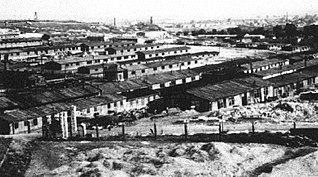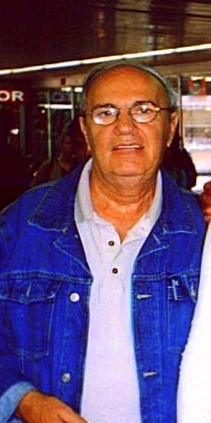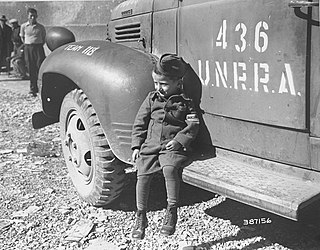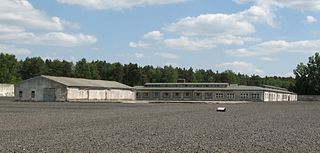Related Research Articles

Buchenwald was a Nazi concentration camp established on Ettersberg hill near Weimar, Germany, in July 1937. It was one of the first and the largest of the concentration camps within Germany's 1937 borders. Many actual or suspected communists were among the first internees.
Karl-Otto Koch was a mid-ranking commander in the Schutzstaffel (SS) of Nazi Germany who was the first commandant of the Nazi concentration camps at Buchenwald and Sachsenhausen. From September 1941 until August 1942, he served as the first commandant of the Majdanek concentration camp in occupied Poland, stealing vast amounts of valuables and money from murdered Jews. His wife, Ilse Koch, also took part in the crimes at Buchenwald.

Ohrdruf was a German forced labour and concentration camp located near Ohrdruf, south of Gotha, in Thuringia, Germany. It was part of the Buchenwald concentration camp network.

Gross-Rosen was a network of Nazi concentration camps built and operated by Nazi Germany during World War II. The main camp was located in the German village of Gross-Rosen, now the modern-day Rogoźnica in Lower Silesian Voivodeship, Poland, directly on the rail-line between the towns of Jawor (Jauer) and Strzegom (Striegau). Its prisoners were mostly Jews, Poles and Soviet citizens.

Płaszów or Kraków-Płaszów was a Nazi concentration camp operated by the SS in Płaszów, a southern suburb of Kraków, in the General Governorate of German-occupied Poland. Most of the prisoners were Polish Jews who were targeted for destruction by Nazi Germany during the Holocaust. Many prisoners died because of executions, forced labor, and the poor conditions in the camp. The camp was evacuated in January 1945, before the Red Army's liberation of the area on 20 January.

Robert Clary was a French actor who was mainly active in the United States. He is best known for his role as Corporal Louis LeBeau on the television sitcom Hogan's Heroes (1965–1971). He also had recurring roles on the soap operas Days of Our Lives (1972–1987), and The Bold and the Beautiful (1990–1992).
The Holocaust has been a prominent subject of art and literature throughout the second half of the twentieth century. There is a wide range of ways–including dance, film, literature, music, and television–in which the Holocaust has been represented in the arts and popular culture.

David Faber was a Polish Jew who survived nine concentration camps in occupied Poland and Nazi Germany. He was also an award-winning educator and lecturer on The Holocaust.

Herman A. Rosenblat was a Polish-born American author, known for writing a fictitious Holocaust memoir titled Angel at the Fence, purporting to tell the true story of a girl who passed him food through the barbed-wire fence at the Schlieben sub-camp of the Buchenwald concentration camp in World War II. The book was planned to be published in 2009 by Berkley Books, but was cancelled after it turned out that many elements of his memoir were fabricated and some were contrary to verifiable historical facts. Rosenblat later admitted to lying on purpose with the intention of bringing joy.
Josef Perl was a Holocaust survivor who dedicated twenty years of his life to educating people about the Holocaust. He was born in Czechoslovakia and later lived in Bushey, Hertfordshire, England. He received more than 30,000 letters from schoolchildren to whom he spoke about his experiences.

Joseph Schleifstein is a Polish-born American who survived the Buchenwald concentration camp during the Holocaust at the age of four. He was hidden by his father in a large sack, enabling him to avoid detection by SS guards when arriving at the camp. Other prisoners helped his father keep him hidden and Schleifstein survived until the Americans liberated the camp. After World War II, Schleifstein and his parents emigrated to the United States. He did not discuss his wartime experiences for decades, even with his children. His case gained publicity in 1999 with the anniversary of the 1997 movie Life is Beautiful; it was discovered Schleifstein's story was an inspiration for the script. This led to a search for him and an eventual newspaper interview.

Ravensbrück was a Nazi concentration camp exclusively for women from 1939 to 1945, located in northern Germany, 90 km (56 mi) north of Berlin at a site near the village of Ravensbrück. The camp memorial's estimated figure of 132,000 women who were in the camp during the war includes about 48,500 from Poland, 28,000 from the Soviet Union, almost 24,000 from Germany and Austria, nearly 8,000 from France, and thousands from other countries including a few from the United Kingdom and the United States. More than 20,000 of the total were Jewish. Eighty-five percent were from other races and cultures. More than 80 percent were political prisoners. Many prisoners were employed as slave labor by Siemens & Halske. From 1942 to 1945, the Nazis undertook medical experiments on Ravensbrück prisoners to test the effectiveness of sulfonamides.
Laura Hillman was a German-born American survivor of Holocaust concentration camps, including Auschwitz-Birkenau. She was also a Schindlerjude, who survived the Holocaust with the help of Oskar Schindler. She was also a writer and memoirist, as well as a lecturer on the Holocaust, and a docent at the Long Beach Museum of Art. In 2005, she published i will plant you a lilac tree – a memoir of a Schindler's list survivor, a young adult book about her experiences during the Holocaust.
Martin Greenfield was an American master tailor, based in Brooklyn, New York, specializing in men's suits. He was described as the best men's tailor in the United States. His list of clients included six U.S. Presidents, as well as other notable politicians and celebrities. His company, Martin Greenfield Clothiers, also has a white-label business, fashioning men's suits for clothing lines DKNY and Rag & Bone, and the television show Boardwalk Empire.
Nanette Konig-Blitz is a Bergen-Belsen concentration camp survivor and former classmate of Anne Frank. She has lived in São Paulo, Brazil since 1953. In 2015, she published a book about being a Belsen survivor called Eu Sobrevivi ao Holocausto. On Holocaust Memorial Day 26 January 2018, Nanette's book was published in English with the title Holocaust Memoirs of a Bergen-Belsen Survivor & Classmate of Anne Frank.

Gena Turgel was a Jewish Polish author, educator, and Holocaust survivor.
Romek “Robbie” Waisman is a Polish-Canadian educator and active member of the Holocaust survivor community in Canada. In 1944, he was interned at the Buchenwald concentration camp and forged strong relationships with the other children imprisoned there. After the war, he briefly lived in France, where he studied and came to terms with his new life as a war orphan.
Marian Ciepielowski was a Polish physician and scientist. A survivor of the Buchenwald concentration camp, he is best known for his activity as a saboteur within the camp's vaccine production unit. Ciepielowski's actions resulted in useful vaccines being distributed to camp inmates, while inactive and useless "vaccines" were sent to Nazi soldiers. After the war he emigrated to the United States.

Henri Kichka was a Belgian writer and Holocaust survivor who was one of the leading figures in Holocaust education in Belgium. Kichka was the only member of his family to have survived the deportation of Belgian Jews to camps in Central and Eastern Europe. He began speaking on the importance of the memory of those who perished at the hands of the Nazis in the 1980s and spoke widely on his experiences to school audience. In 2005, published his autobiography, Une adolescence perdue dans la nuit des camps with a preface by the French historian Serge Klarsfeld. He is the father of cartoonist Michel Kichka.
Sabina Zimering was a Polish-American ophthalmologist and memoirist known for sharing her experiences during the Holocaust. Born in Poland, she survived the Holocaust living in Germany under an assumed identity as a Catholic Pole. After the war, she resumed her studies and earned a medical degree at Munich Medical College, one of the only women and Jewish students to do so. She immigrated to the United States to join what family remained after the Holocaust, and practiced ophthalmology. In 2001, she published her memoirs, Hiding in the Open: A Holocaust Memoir, which has twice been adapted as a play.
References
- ↑ Faber, David; James D. Kitchen (2003). Because of Romek: a Holocaust survivor's memoir. El Cajon, CA: Granite Hills Press. ISBN 0-9638886-2-5. OCLC 37176693.
- ↑ Sonia Eliot (27 May 2009). "Because of Romek". San Diego Reader.
- ↑ Ms. Waddle (30 May 2012). "Because of Romek: A Holocaust Survivor's Memoir". Chaffey Library.